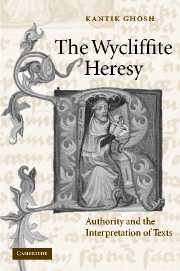Book contents
- Frontmatter
- Contents
- Acknowledgements
- List of abbreviations
- Introduction
- 1 John Wyclif and the truth of sacred scripture
- 2 William Woodford's anti-Wycliffite hermeneutics
- 3 Vernacular translations of the Bible and ‘authority’
- 4 The English Wycliffite sermons: ‘thinking in alternatives’?
- 5 Nicholas Love and the Lollards
- 6 Thomas Netter and John Wyclif: hermeneutic confrères?
- Afterword: Lollardy and late-medieval intellectuality
- Notes
- Bibliography
- Index of names and titles
- General index
- CAMBRIDGE STUDIES IN MEDIEVAL LITERATURE
2 - William Woodford's anti-Wycliffite hermeneutics
Published online by Cambridge University Press: 22 September 2009
- Frontmatter
- Contents
- Acknowledgements
- List of abbreviations
- Introduction
- 1 John Wyclif and the truth of sacred scripture
- 2 William Woodford's anti-Wycliffite hermeneutics
- 3 Vernacular translations of the Bible and ‘authority’
- 4 The English Wycliffite sermons: ‘thinking in alternatives’?
- 5 Nicholas Love and the Lollards
- 6 Thomas Netter and John Wyclif: hermeneutic confrères?
- Afterword: Lollardy and late-medieval intellectuality
- Notes
- Bibliography
- Index of names and titles
- General index
- CAMBRIDGE STUDIES IN MEDIEVAL LITERATURE
Summary
One of John Wyclif's important and abiding generalisations about the nature of the Christian faith was that all ‘truths’ necessary to faith are found ‘expressly’ in the Bible, and the more necessary, the more expressly: ‘omnis veritas est ex scriptura, et ut necessarior est expressior’. The word ‘express’, with its implicit denial of a readerly or institutionally ordained hermeneutics in the construction of meaning, brings to a focus one of the key issues raised by the Lollard heresy: that of the role of interpretation in establishing what is ‘authoritative’. In William Woodford's Quattuor Determinationes in Materia de Religione, a set of four anti-Wycliffite tracts investigating the nature of ‘authority’, the ‘expressness’ or otherwise of biblical meanings forms one of the crucial points of debate.
William Woodford, Vicar to the Franciscan Minister Provincial of England in 1390, was a polemicist who wrote voluminously against Wyclif from around 1376 (De dominio civili clericorum) till 1397 (De causis condemnacionis articulorum 18 damnatorum Joannis Wyclif). He wrote primarily in defence of the mendicant orders, but, as Anne Hudson points out, he ‘was regarded by his contemporaries as a spokesman for a less sectarian position as well’. In particular, his Causis condemnacionis was written to the commission of Archbishop Arundel. The Quattuor Determinationes, written in the Oxford Schools in 1389–90 after Wyclif's death, is a defence of the so-called ‘private’ religions and a demonstration that they are ‘authoritative’.
- Type
- Chapter
- Information
- The Wycliffite HeresyAuthority and the Interpretation of Texts, pp. 67 - 85Publisher: Cambridge University PressPrint publication year: 2001



